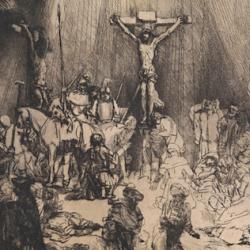Like some other recent writers on the atonement, Sharon Baker argues (Executing God, 125), in a fashion similar to Thomas, that “the sacrifice of Jesus Christ on the cross was acceptable to God not because of the external offering of Christ’s body with its dripping blood, but because of the internal disposition with which it was offered.” Jesus gave Himself in toto “to God and others.”
More than that, Baker says, “the sacrifice of Jesus was an act of forgiveness” – not the basis for forgiveness, as in substitutionary theories, but the sacrifice of forgiveness itself: By giving Himself, Jesus “sacrificed the right to take vengeance on those who killed him, and as God he sacrificed the right to receive payback for sin. In other words, Jesus forgave sin, gave up getting paid back for the debt sin incurred, pardoned the offense without remuneration of any sort. Quite a selfless, life-giving sacrifice.” She adds that, tough forgiveness may not seem sacrificial, it is the “ultimate sacrifice” since “We give up the pleasure of getting even. We sacrifice getting paid back.” Forgiveness “costs us.”
A page further on, she adds, “Hanging from the cross, his blood pouring out, sprinkling the ground below him, Jesus cried out, ‘Father forgive them, for they don’t know what they are doing.’” She connects this with the Old Testament idea of atonement, kippur, emphasizing that by His forgiveness Jesus “cleanses us, purifies us.” Receiving Jesus, “we tap into his life, symbolized by the shedding of his blood. We receive God’s forgiveness, symbolized by the sprinkling of his blood” (126).
Now, it’s not clear to me what Baker achieves by all this. On the one hand, she denies that God demands anything as a pre-requisite to forgiving; He simply forgives, and bears the cost of forgiving. But if that’s true, and if the cross is Jesus doing the costly work of forgiving, it’s not clear why the cross is needed at all. Couldn’t the Father, or Jesus, simply forgive without all the mayhem of crucifixion – perhaps reminding us just how tough it is to give up the desire for revenge? Baker seems to turn the cross into an object lesson on the difficulty of forgiveness, or a “symbol” of forgiveness that might have been, and indeed is, granted quite apart from the cross. She’s trying to protect God’s good name, His name as Good, but this seems to be at least as damaging as the atonement theories she rejects. It seems to involve the Father giving over the Son to the cross to make a point.
On the other hand, though she wants to stress that blood is a symbol of life, not death, and that it cleanses rather than pays off or propitiates, she’s still left with the irreducible fact: Jesus’ bleeding was part of the process of His dying. And she seems to affirm that His death was necessary to secure the blood of cleansing and atonement, in which case it’s not clear how far she’s been able to go away from the atonement theories she’s rejecting.














